Redditor Guilt-Tripped By Mom For Adopting Kitten Instead Of Her Friend’s Elderly Cat
Like children, kitties are energetic, brave, lively, inherently amusing, and joyful. However, living with them can be somewhat draining, as they lack an "off" switch.
But then, everyone has moments in their lives when they just need calm, quiet, and cozy company! Here comes the elderly cat, full of love and affection, eager to bring peace into the house.
They even have a positive effect on mood swings. Senior cats frequently end up at shelters because their elderly owners have passed away, and no one is there to take care of them.
The good news is that everyone gets along well with them as housemates. On the other hand, some people prefer kittens to elderly cats, and that's totally fine.
The OP of today's story told his parents that he was thinking about getting a cat. He informed his mom that kittens are frisky and tend to scratch people's legs, so he wouldn't be walking around barefoot.
OP's mom suggested that he get an adult cat instead, as it might be easier. OP told her that adult cats come with their own challenges, but she didn't understand.
She called the OP later on, saying that her friend had a cat, Ryan, whom she unfortunately needed to find a new home for. Ryan is an elderly cat with kidney issues, and the OP wasn't cut out for it.
He related this to his mom, but it seems she forgot about their conversation.
The OP writes
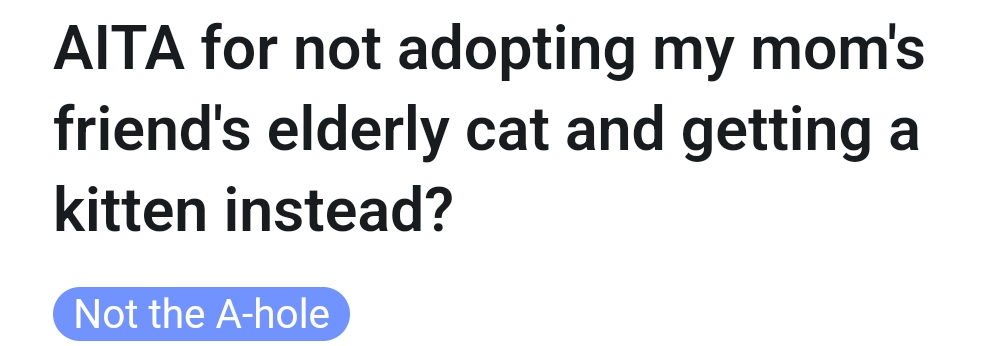
OP's mom suggested that he get an adult cat instead
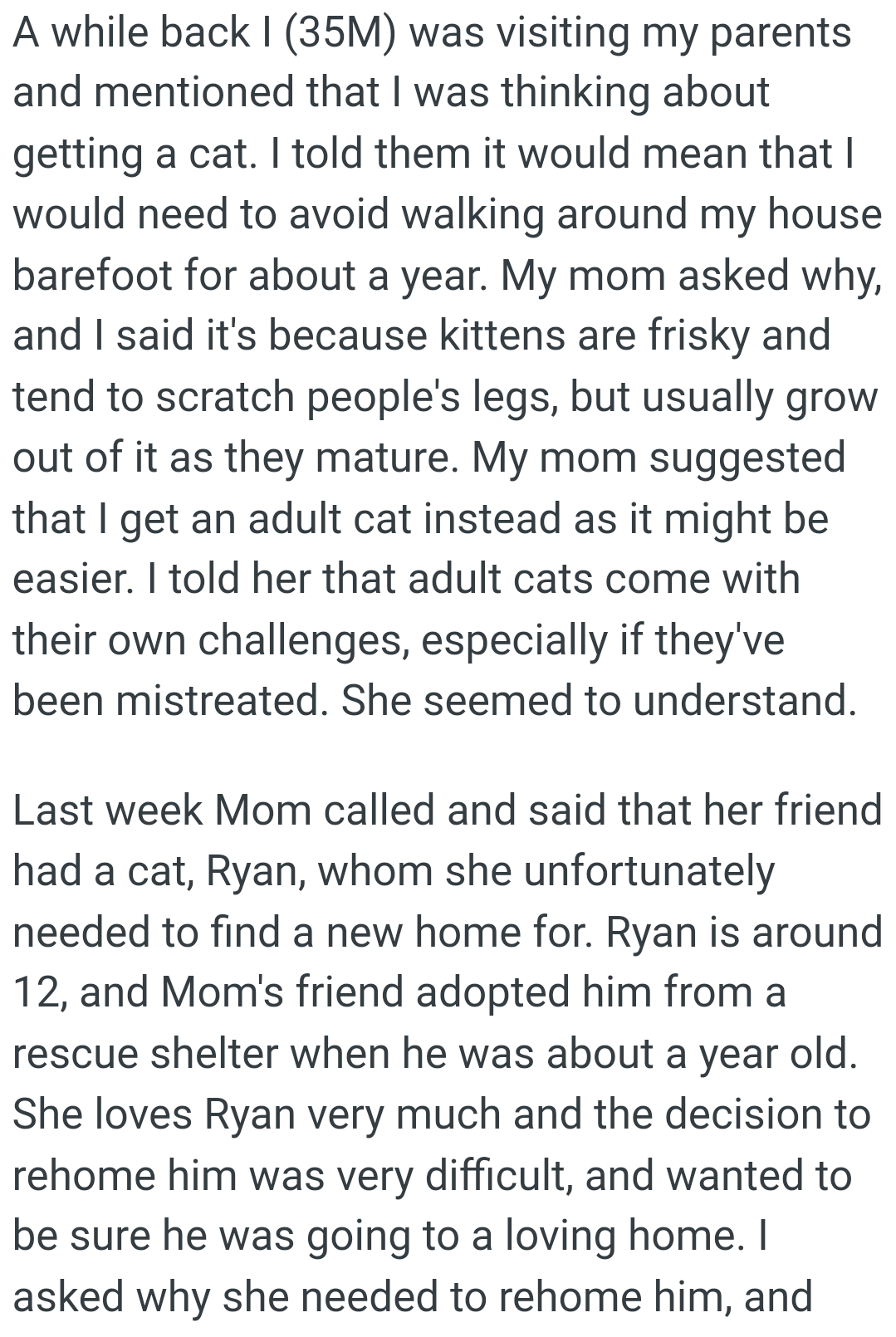
Dr. John Smith, a clinical psychologist, highlights how familial expectations can create significant emotional conflict. In this case, the Redditor's mother exhibits guilt-tripping behavior, which can stem from a desire for connection and validation. Research indicates that guilt can be a powerful tool in influencing behavior, often used unconsciously by caregivers who feel neglected or overlooked.
According to a study published in the Journal of Family Psychology, such dynamics can lead to resentment and decreased family cohesion if left unaddressed.
The cat probably wouldn't adjust well to a new home with a new human
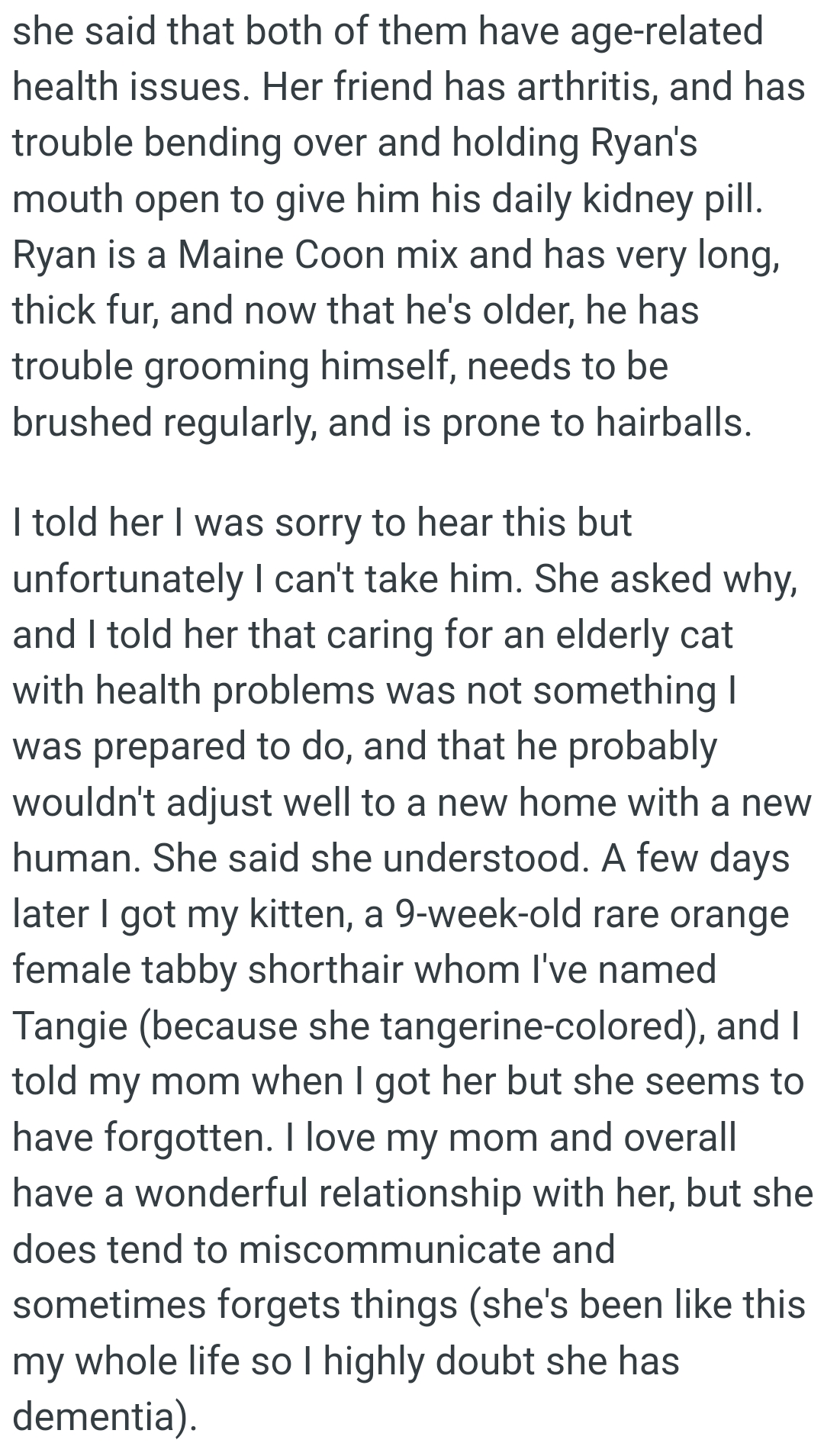
They argued for several minutes, and she was growing increasingly angry
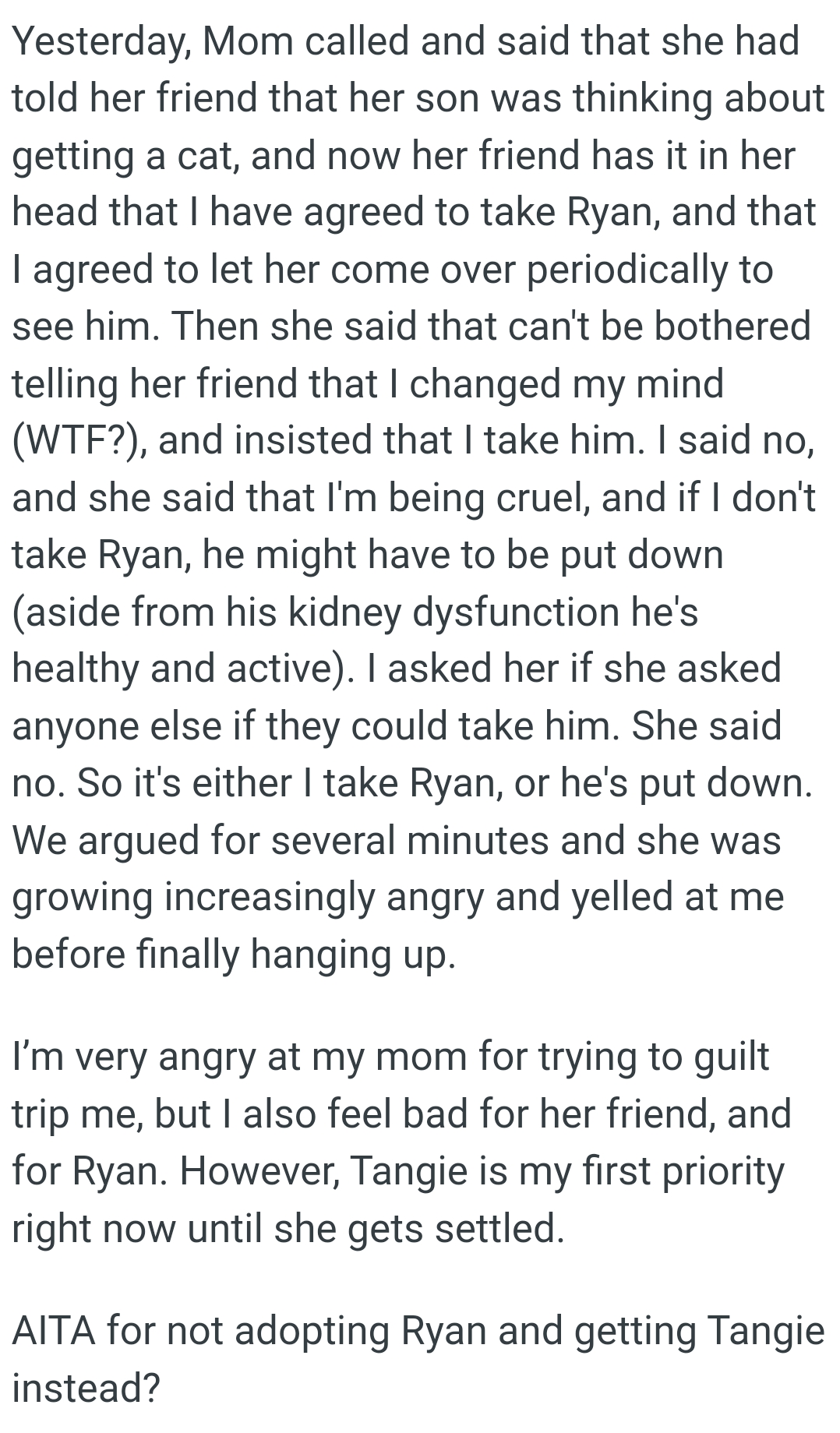
To address guilt and emotional conflicts, experts recommend employing assertiveness techniques. A licensed therapist suggests practicing 'I' statements to express feelings without assigning blame. For example, saying, 'I feel overwhelmed when pressured to adopt a pet' can clarify feelings without escalating tension.
Additionally, setting boundaries with family members is essential. Research indicates that clear boundaries enhance emotional health and can reduce feelings of guilt, as they allow individuals to honor their needs while still maintaining family relationships.
And the comments roll in...
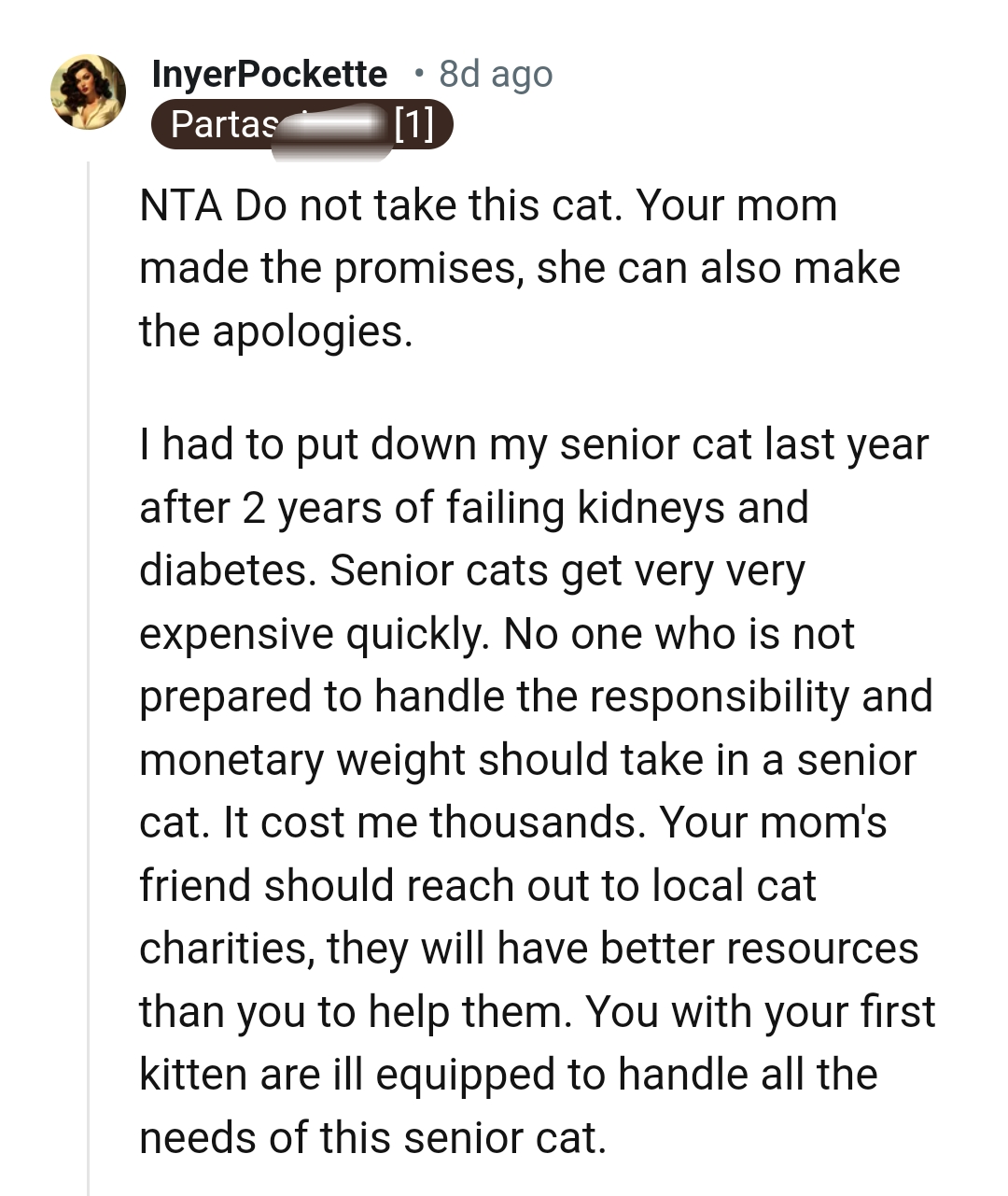
It's not the same
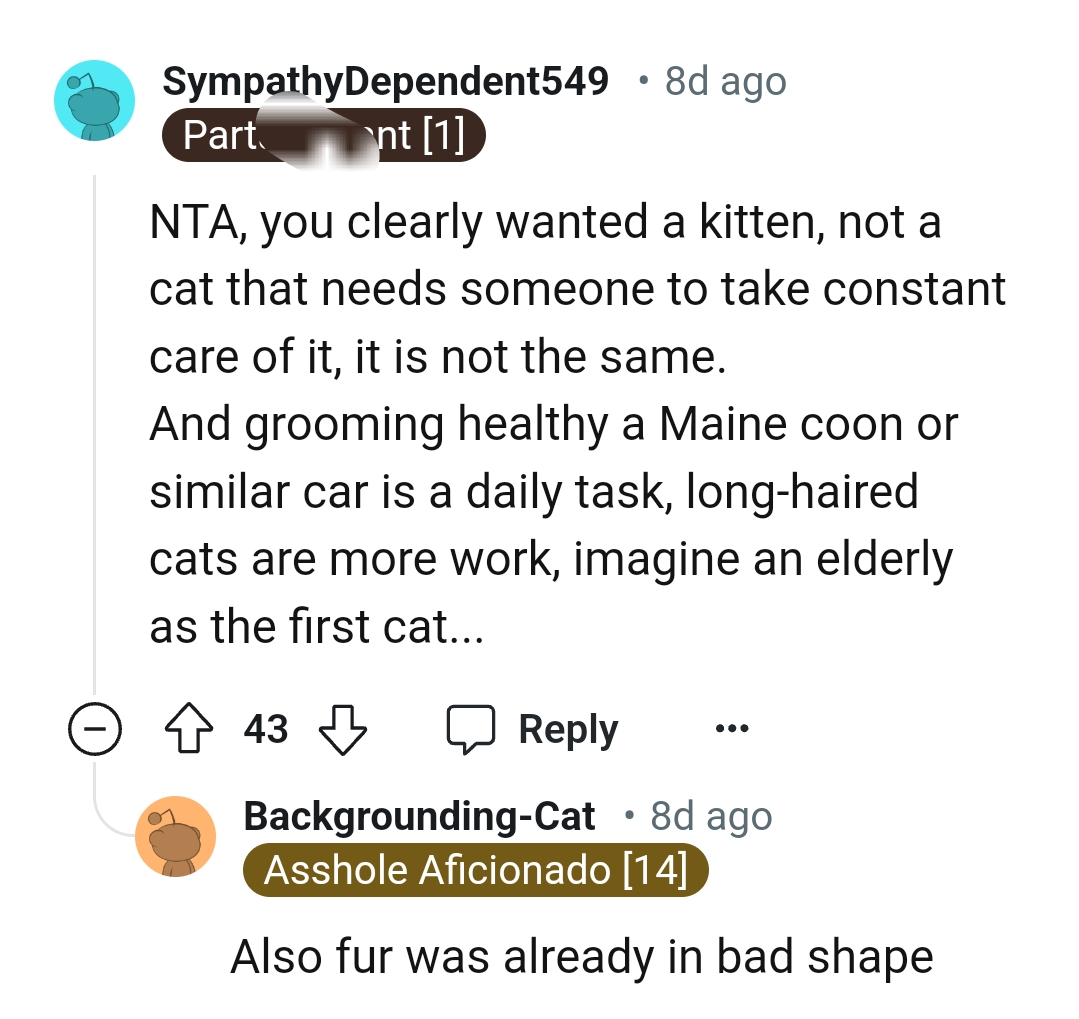
Understanding Family Expectations
Dr. Patricia Lee, a psychologist at the University of Chicago, discusses the pressure individuals often feel from family expectations surrounding pet ownership.
Her research indicates that family dynamics can lead to feelings of guilt when individuals make choices that differ from family members’ expectations.
This pressure can complicate relationships and create resentment when individuals feel judged for their decisions.
The OP is shocked
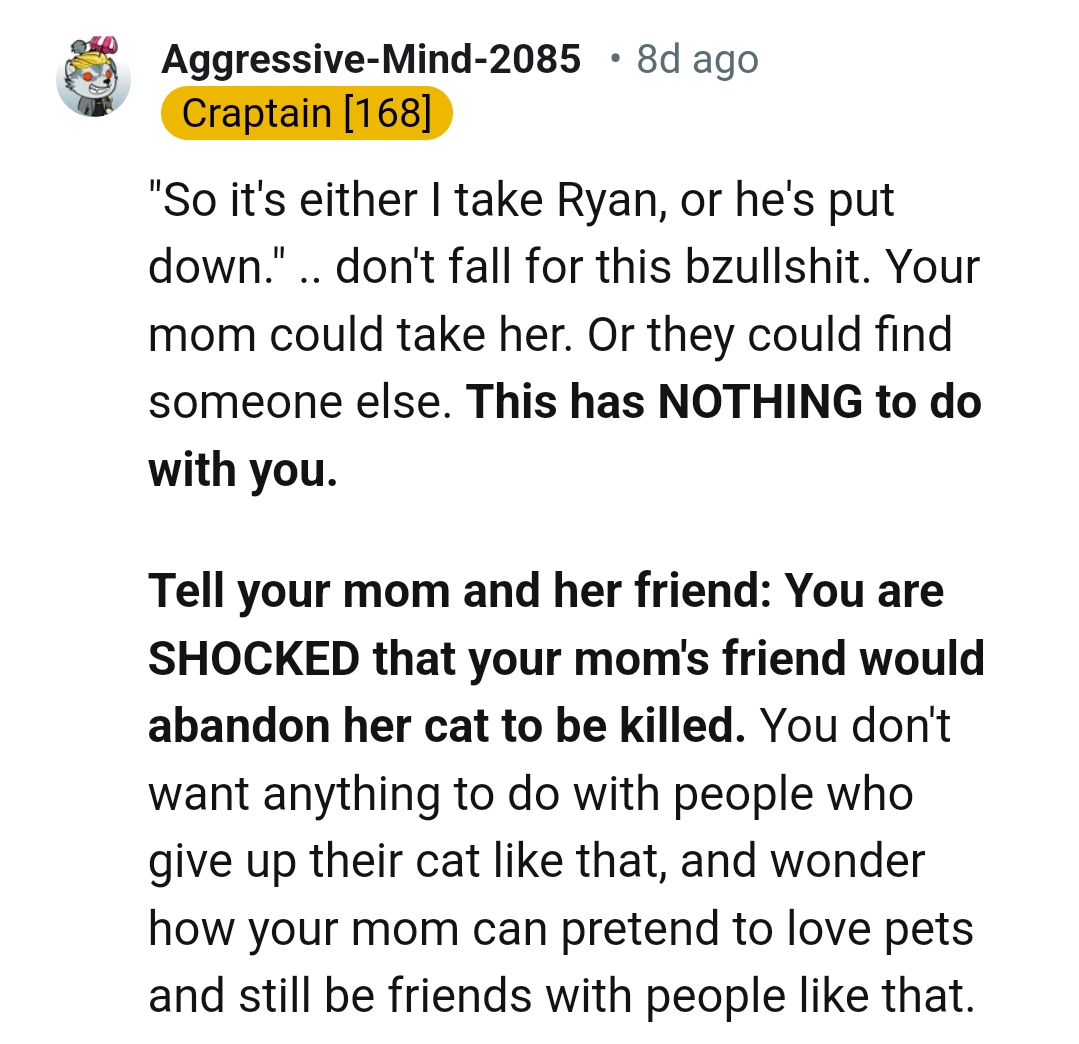
Adopting an elderly cat
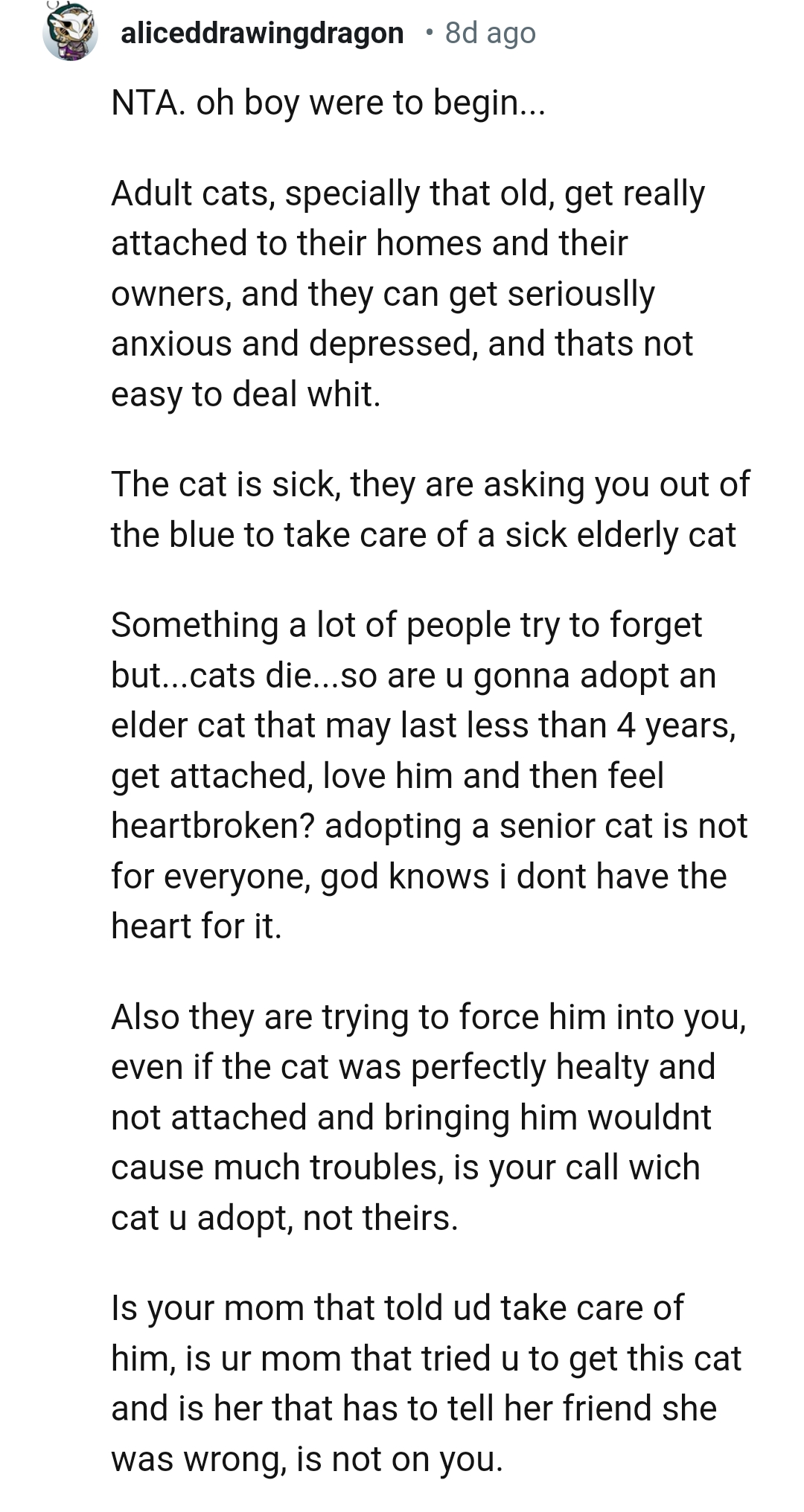
OP has offered the following explanation for why they think they might be the AH:
I feel like I am the AH because I got angry with my mom for trying to guilt-trip me into adopting her friend's cat instead of getting a kitten. She's telling me I'm being cruel. At the same time, I feel bad for my mom's friend as well as the cat.
It's not OP's responsibility
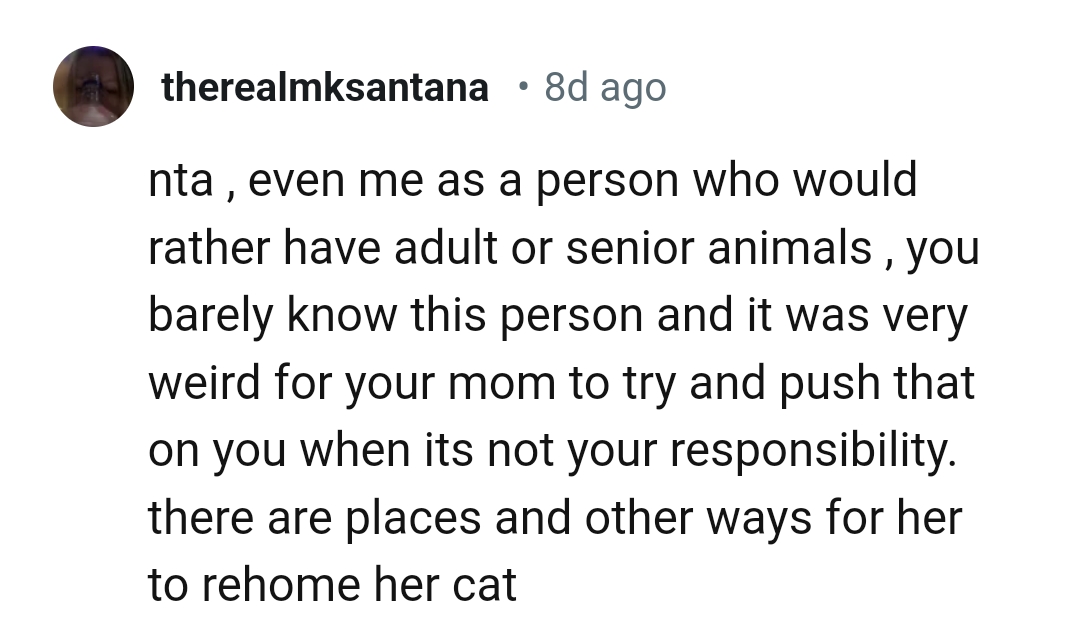
Revoking the access
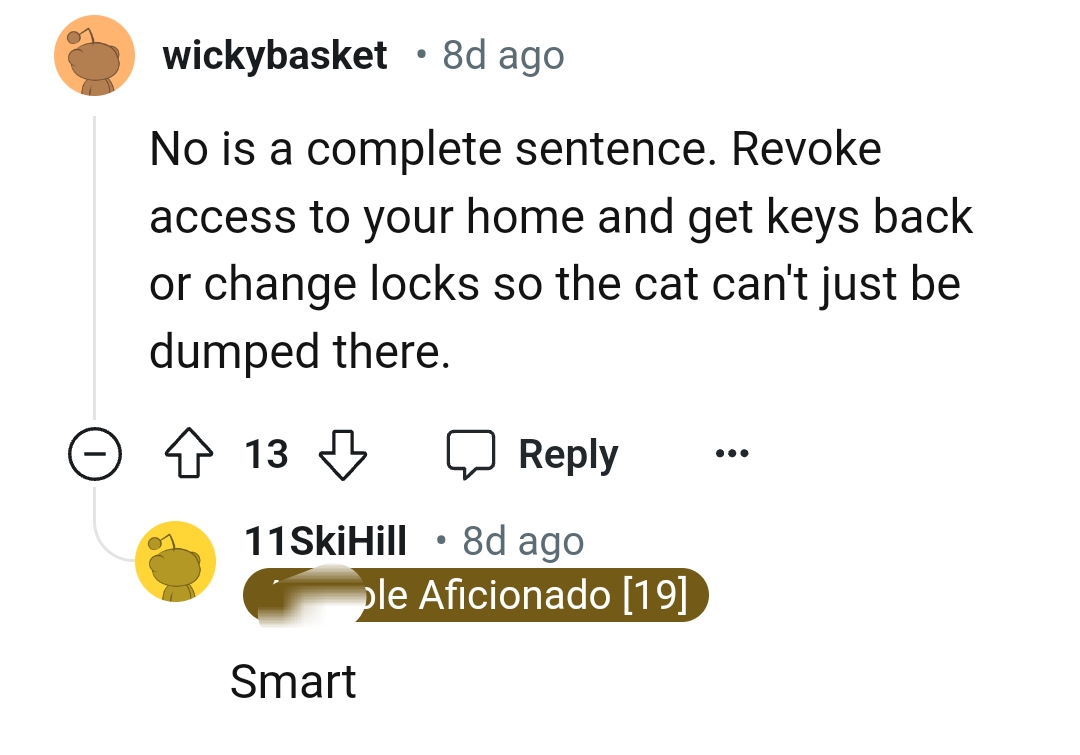
The Role of Guilt in Relationships
Guilt often serves as a social mechanism, promoting compliance and connection within familial ties. The American Psychological Association notes that when individuals feel guilty, they may overcompensate to restore harmony, which can lead to resentment over time. Research shows that this emotional manipulation can be particularly damaging in parent-child relationships, fostering a cycle of obligation.
Open communication about feelings and desires can help mitigate these feelings of guilt, allowing healthier dynamics to flourish.
Cats require work
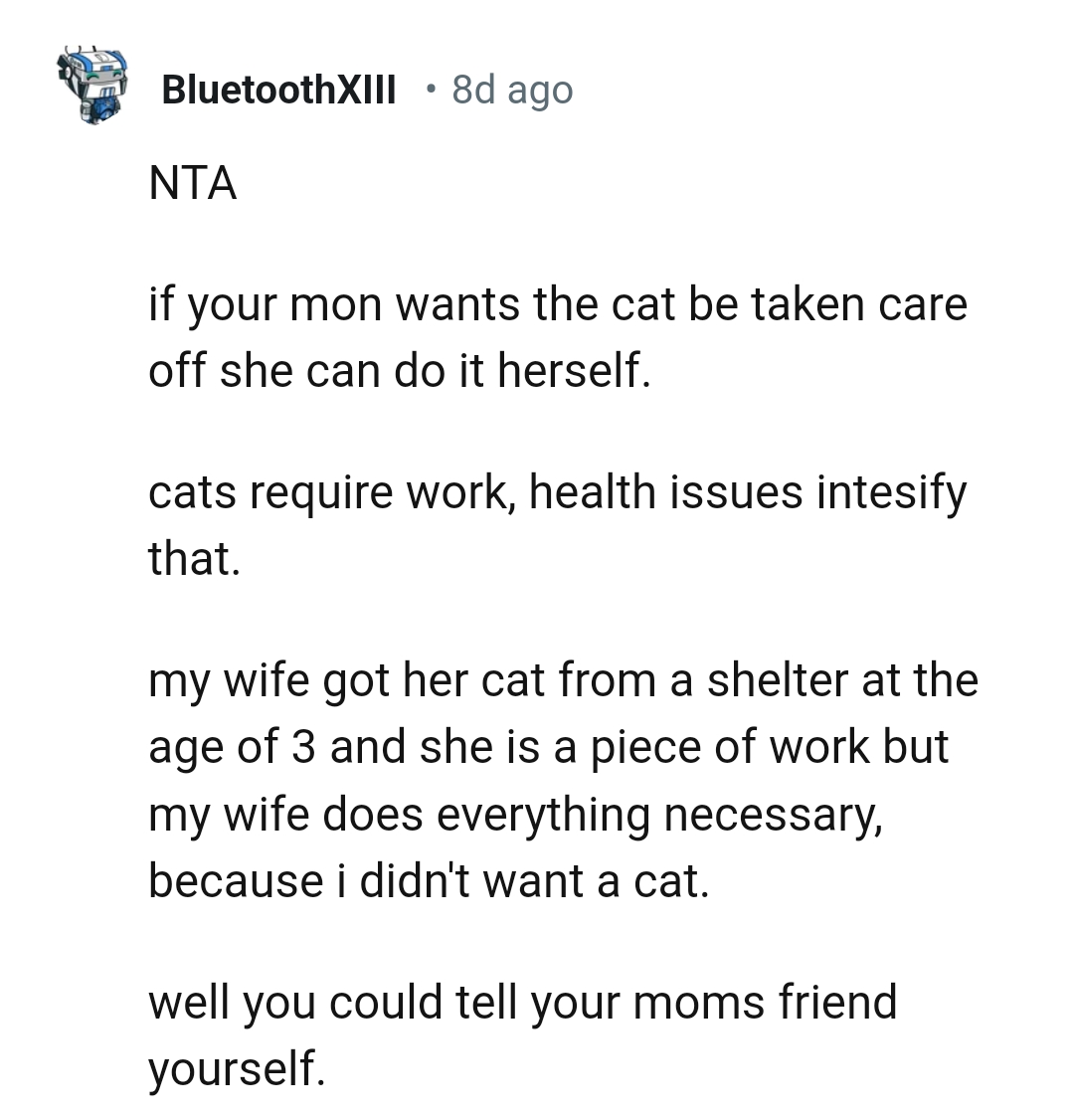
A non-pet facility
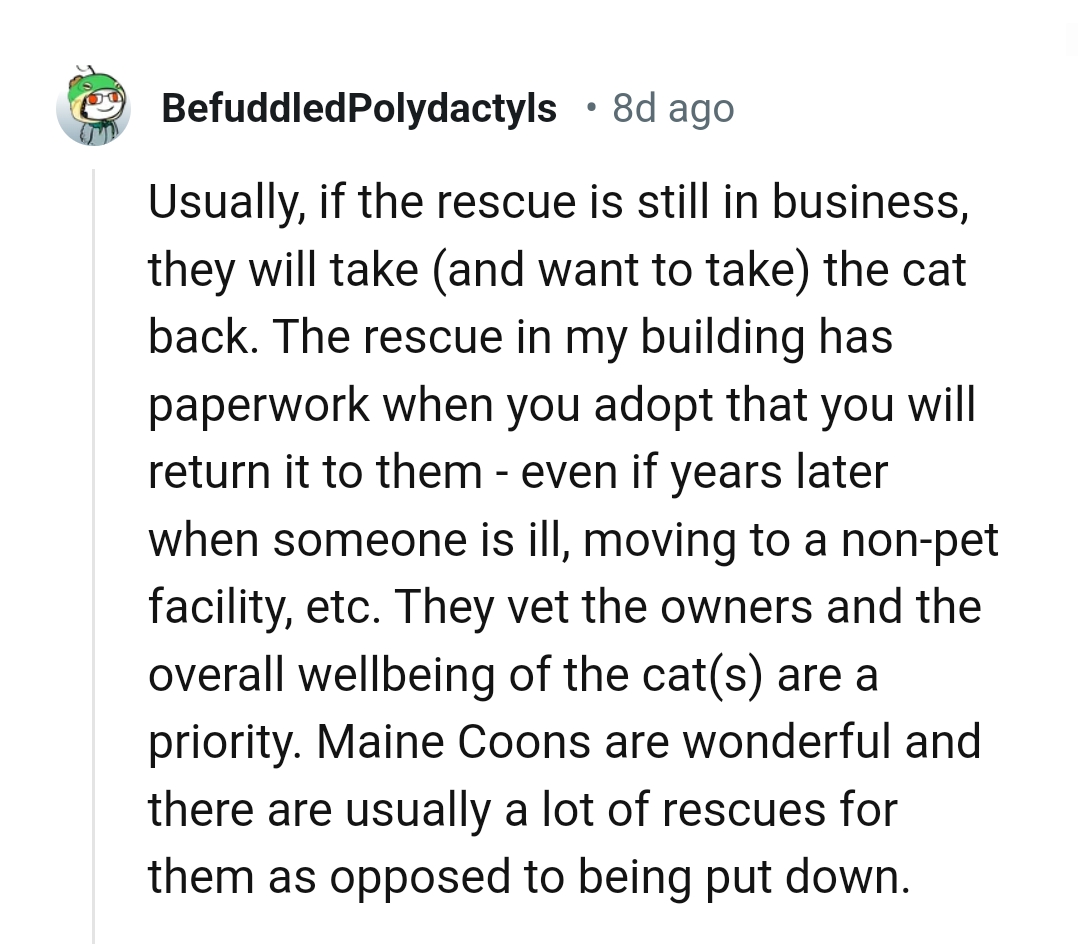
Psychological studies show that family members often project their values onto one another, leading to conflicts over personal choices. Dr. Susan David, an expert in emotional agility, states, "When we allow others' expectations to dictate our choices, we can experience significant emotional turmoil." Her insights on navigating these dynamics can be found at susandavid.com. Understanding these dynamics can help mitigate feelings of guilt and resentment.
Psychological Analysis
The Redditor's experience shows how family pressure can lead to guilt and conflict over personal decisions. It's important to remember that everyone has the right to make choices that align with their own values and lifestyle. Open communication and setting boundaries can help manage these family dynamics.
Analysis generated by AI
The OP left this edit later on...
I forgot to mention that Ryan has a history of fighting with and seriously injuring other cats, which was something that my mom's friend was aware of when she adopted him from the shelter.
I think his original owners waited too long to have him neutered, or maybe he wasn't neutered when he was taken to the shelter. I don't know for sure, but in any case, my mom's friend was told that one of Ryan's requirements was that he be the only cat in the household.
According to Dr. Emily Carter, a developmental psychologist, the bond formed between a pet and its owner can significantly improve mental well-being. Pets, especially younger ones, provide companionship and unconditional love, which may be more appealing than caring for an elderly cat that requires more attention and empathy.
Studies show that interactions with pets can reduce stress and anxiety levels, making them valuable companions for individuals seeking emotional support, especially during transitional phases in life.
The Role of Open Communication
According to a study published in the Journal of Family Psychology, open communication is crucial in family dynamics to prevent misunderstandings.
When family members fail to express their feelings, it can lead to assumptions and increased tension.
Encouraging dialogue can help family members understand each other's perspectives and reduce conflict.
Exploring Emotional Decision-Making
Behavioral economists have found that emotional factors often overshadow rational decision-making. In the case of adopting a kitten versus an elderly cat, emotional appeal plays a significant role. Research published in the Journal of Behavioral Decision Making indicates that appealing choices are often made based on immediate emotional gratification rather than long-term consequences.
Understanding the basis of these emotional choices can help individuals make more balanced decisions in the future, considering both their feelings and responsibilities.
To address issues arising from family expectations, individuals should prioritize honest communication about their choices.
Setting boundaries and expressing their values can help alleviate feelings of guilt and promote understanding.
Research indicates that developing assertiveness skills can empower individuals to navigate family dynamics more effectively.
Clinical Perspective & Next Steps
Understanding the dynamics of familial expectations and emotional decision-making is crucial for healthy relationships. As demonstrated, guilt can serve as both a motivator and a source of conflict, necessitating thoughtful communication and boundary-setting. Addressing these issues openly can promote healing and foster deeper connections.
Ultimately, balancing personal desires with familial obligations requires both self-awareness and assertiveness, skills that can be developed through practice and therapeutic support. Engaging in these strategies can lead to more fulfilling relationships and emotional well-being.



